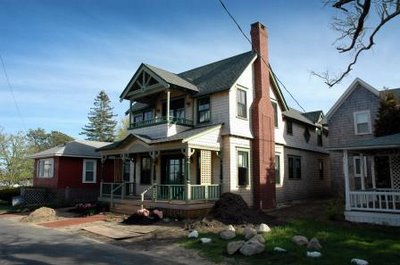WHAT’S “WRONG” WITH THE MARTHA’S VINEYARD REAL ESTATE MARKET
Starting with the premise that commerce is activated by supply and demand, I want to look at what is wrong with the Martha’s Vineyard real estate market today. What I discovered was that, in fact, there is nothing wrong with the Martha’s Vineyard real estate market; it is just that this market is confusing to many people and even more confusing today given the dire conditions in the financial market and a disparity in seller motivation factors. But first let me establish a few facts as guidelines:
<> This is not a place people have to be, they want to be here. Martha’s Vineyard is a destination and for the most part, a second home market.
<> This Island is only 20.5 miles long, 87.48 square miles in total land area --- they are not making any more of Martha’s Vineyard.
<> With home prices averaging almost 100% higher than the national average, ranging from $300,000 for a shabby ‘fixer-upper’ to $25,000,000 and above not everyone can afford to swallow that pill.
<> The cost of living is about 60% above the mean, so once again living here is surely not for everyone, but that does not diminish its popularity.
<> There are between 775 and 850 properties on the market, depending upon the method of tabulation used, which is about four times as many properties as there were at the height of the market.
<> The current inventory is about one-quarter of what we had to deal with after the market broke in 1988, and the population density has increased significantly since 1990.
The total inventory at the time of this writing totals 777 properties. I want to break down that number, which includes all classifications of properties so you have a better perspective:
<> Up to $200,000 = 7 properties (Note: This includes a share in a fishing camp, an aircraft hanger, time shares and an office condo.)
<> $201,000 - $400,000 = 86 properties
<> $401,000 - $600,000 = 162 properties
<> $601,000 - $800,000 = 140 properties
<> $801,000 - $1,000,000 = 85 properties
<> $1,100,000 - $2,000,000 = 157 properties
<> $2,100,000 - $3,000,000 = 51 properties
<> $3,100,000 - $5,000,000 = 54 properties
<> $5,100,000 – $30,000,000 = 35 properties
Only 18% of the inventory is above $2,000,000. That means the so-called lower end of the market is where the fat is. However, within that segment lies a misleading inflationary factor --- sellers who do not have to sell.
For a few years now we have been reading about how the real estate market has tanked in some areas of the country, falling into what many view as a fathomless abyss. The media has us believing this was the general condition everywhere. In an attempt to educate consumers, the National Association of Realtors® launched an educational campaign proclaiming ‘all real estate is local’. This is true, all real estate is local and in many parts of the country the market has been pretty much stable or a recovery is under way. But the message came too late, the die was cast, and for most of the country sales activity started to stall. Sellers started to panic and buyers delighted that the tide was turning in their favor. No longer would the buyers be at the mercy of a seller’s market. Even on Martha’s Vineyard buyers believed they finally had a chance to get a foothold on their dream Island.
Overall, however, property values still remain solid on Martha’s Vineyard. Yes, I am serious. If you are interested in real estate on Martha’s Vineyard, you should be paying attention to this local market and not be influenced by broad brush studies that are based on limited national metropolitan samplings. I don’t deny there are pockets across the country where prices have fallen 40% or more. These areas are not the norm. On Martha’s Vineyard, overall, the price drop has only gone down about 14% since 2006. For anyone who invested in Martha’s Vineyard real estate 5, 10, or 20 years ago, the good news is their investment has increased handsomely in value over that time period, even with the occasional bumps in the economic highway.
Exclusive Buyer Agents, such as SplitRock Real Estate, work very hard to educate consumers and create Power Buyers. I have a number of buyer/clients who have been working with me for 6 months, a year, even three years or more. They have a sincere desire to be here if they can only find the right property at the right price (Isn’t that typical of what motivates buying decisions?). Much to their chagrin they are discovering that prices on the Vineyard make no sense. Comparables are difficult to come up with, and ultimately the buying decision has to be an emotional decision. For those who are thinking long term and understand the fundamentals of real estate investment, the fact that prices overall have not gone down much should be a reassuring factor that lends more confidence to a buying decision. For others, if they cannot afford to make the investment now they will regrettably join the ranks of the would-have, should-have, could-have buyers.
So what is wrong with the Martha’s Vineyard real estate market? Buyers who enter the Martha’s Vineyard real estate market, regardless of whether it is an up or a down market are confused and scared. They do not want to make a mistake or appear foolish. There are many sellers who are sincerely motivated and will actively compete, engage and negotiate with buyers to sell their properties in this market. I am not including what we call distress sales, i.e. short sales, foreclosures and bank owned properties (aka REO’s). The problem lies with the ‘ego seller’ who lists their property for sale, but really does not care if they sell now or two years from now. They are not willing to listen to the market (IE their seller agents), and insist on holding a hard line because they think their properties are special, and their posture is "I don't have to sell". I call this the ‘goose that laid the golden egg’ mentality. Sellers who are not competitive are like buyers who are not qualified; they are wasting everyone’s time and money. If you are a serious seller, please don’t be offended by an offer you receive. Be willing to graciously engage with a meaningful counter offer. Properly educating buyers is a difficult, time-consuming process. When they get to a point where they are comfortable making a reasonable offer, if they are coldly rejected by a seller, it sets the whole process back considerably. If you recall the moral of Aesop’s fable, he who wants too much loses everything. In this case it is the entire Vineyard real estate market that is losing.
As average buyers watch the market week after week, the inventory continues to grow. Some buyers hold out, sitting on the sidelines, as they keep hoping those overpriced properties will come down in price. They resist making a buying decision waiting for sellers to cave in. The result is a slow market with minimal inventory absorption. When the inventory was limited, the demand was greater and the market moved briskly. If this market is going to get back in stride, it is my opinion that sellers, who don’t need to sell, should remove their properties from the current inventory. If sellers don’t like where the market is today and they are not willing to be competitive and engage in negotiations, they should wait and relist their properties when happy days are here again. And surely, this too shall pass and happy days will return.
Labels: Buying Martha's Vineyard Real Estate, EXCLUSIVE Buyer Agency, Martha's Vineyard Real Estate, Owning Real Estate, Real Estate Consumer Education, Selling Real Estate, vacation home


